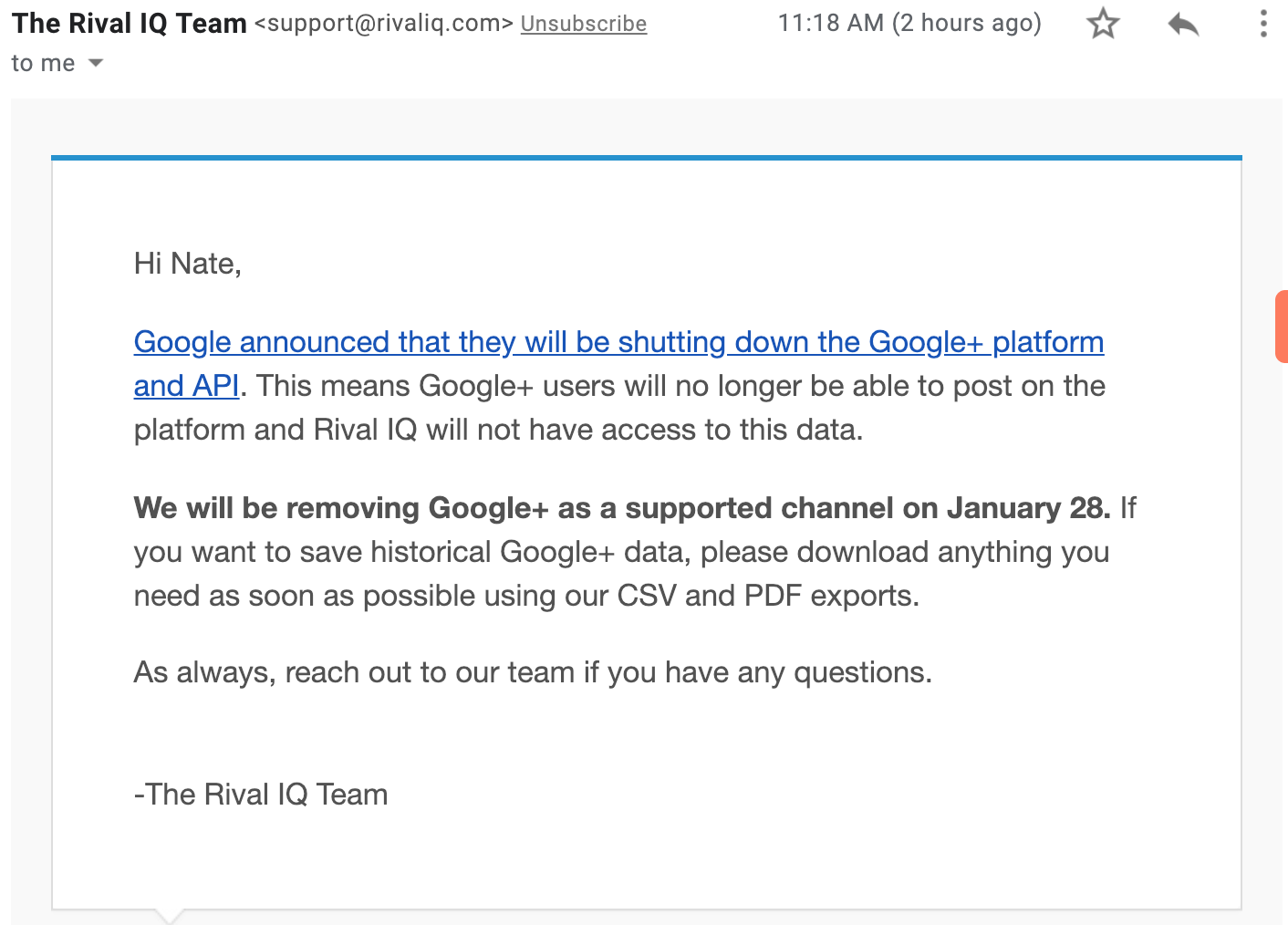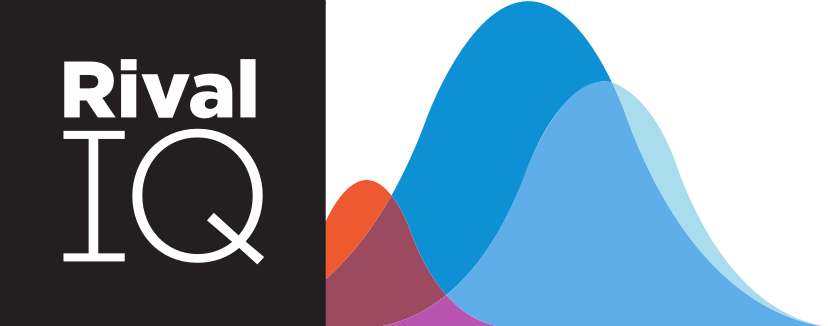It's Official.
Google+ is no more.
Originally thought of by many as Google's attempt at a "Facebook-killer", Google+ was described as a social layer that united many of the apps in Google's vast library.
Gmail, Hangouts, chat, and other more primitive connectivity tools suddenly became more easily accessible to silicon valley venture capitalists, hordes of struggling tech entrepreneurs, and all of the consultants that follow them around.
And those goofy Glass people, but this post isn't about them. Later.
The Bug
My friends over at RivaliQ send me interesting updates on their integration partners and how things are changing from time to time.
If you're not familiar with RivaliQ, they market and sell software that allows you to gather insights on your company's competitive landscape across Google and other social media networks.
I received the email below this past Tuesday, January, 22nd:

Huh. Upon further investigation to Google's web page, I was able to find a letter from David Thacker, VP of Product Management of G Suite.
You can click through to explore on your own, but here are some highlights:
We’ve recently determined that some users were impacted by a software update introduced in November that contained a bug affecting a Google+ API. We discovered this bug as part of our standard and ongoing testing procedures and fixed it within a week of it being introduced. No third party compromised our systems, and we have no evidence that the app developers that inadvertently had this access for six days were aware of it or misused it in any way.
With the discovery of this new bug, we have decided to expedite the shut-down of all Google+ APIs; this will occur within the next 90 days. In addition, we have also decided to accelerate the sunsetting of consumer Google+ from August 2019 to April 2019. While we recognize there are implications for developers, we want to ensure the protection of our users.
Okay. So, inside whatever was left of Google+ seemed to contain a vulnerability that allowed certain app developers to have access to things at Google that Google apparently didn't like.
But don't worry, they didn't notice.
But the folks at Google didn't like it enough that they decided to push up a corporate timeline by three months to sunset the entire thing.
And so, I kept reading to find out more about the specific breach. As it turns out, Google is pretty transparent with the info to the right folks, so it pays to know a few Google API Developer partners.
We have confirmed that the bug impacted approximately 52.5 million users in connection with a Google+ API.
With respect to this API, apps that requested permission to view profile information that a user had added to their Google+ profile—like their name, email address, occupation, age (full list here)—were granted permission to view profile information about that user even when set to not-public.
Google goes on to ensure that no users' financial data was compromised and they will continue to monitor and investigate the bug.
Thacker's page detailing the bug and the announcement of the accelerated doomsday timeline for Google+ also mentions that "apps with access to a user's Google+ profile data also had access to the profile data that had been shared with the consenting user by another Google+ user but that was not shared publicly."
That last part is a bit concerning in that it would seem that that even those Google+ users who chose to lock down their connections and keep their profiles out of the public eye still could have had their private information compromised, depending upon who they were connected with.
The End
I'm not sure many of you will be that upset, but the doomsday timeline for your personal Google+ profile has been accelerated.
If you're an app developer integrating with Google + like the folks at RivaliQ, you and your customers are in the same boat.
Thanks, Google.
Google has promised that more information will be made available soon to both parties as to how they can do things like download information before they pull the plug in April 2019.
We will sunset all Google+ APIs in the next 90 days. Developers can expect to hear more from us on this topic in the coming days, and can stay informed by continuing to check the Google+ developer page.
We have also decided to accelerate sunsetting consumer Google+, bringing it forward from August 2019 to April 2019. We want to give users ample opportunity to transition off of consumer Google+, and over the coming months, we will continue to provide users with additional information, including ways they can safely and securely download and migrate their data.
I know. You're beside yourself. I am too. I mean, what on earth will we do without our Google+ profiles?
You know what we will do?
Exactly what we planned to do on Instagram, Facebook, Reddit, Tinder, etc. etc. etc.
The Rub...
Here's the thing...Google still got what they came for. More of your data.
Back in January of 2011, when Google+ launched, the one thing Google did NOT have was any detailed personal information about you. They didn't understand things like your preferences, demographic information, how you describe yourself, where you worked, your social connections, where you went to school, and many, many other valuable data points
All Google had was search terms and click data, and perhaps the secret rumblings of collecting early voice data through Google Voice, a Gmail VOIP calling app they made available to Gmail users for free, in trade for recording millions of hours of how we humans pronounce things.
Okay, Google?
The other problem Google had was an inherent exit in user behaviors, resulting in very low time on site.
Think about it. When you go to Google, you essentially go to leave as soon as you can. You search, the engine delivers a solid result and you click. You actually spend very little time on Google. This was a problem.
You know where people spent a lot of time in 2011?
Facebook.
Facebook was doling out user profiles. These mystical online destinations allowed users to soul puke volumes of data related to the most minuscule details of their lives into handy little database fields.
The act of keeping up on your own profiles, as well as creeping on the profiles of old high school classmates also took loads of time. And where consumers spend time, brands spend ad dollars.
The combination of advertisers' ability to micro-target audiences who spent unbelievable amounts on Facebook made one thing clear to Google - they wanted in on the action.
And so Google + was born. And all of us early social media adopters flocked to it like seagulls after breadcrumbs.
The Ethics
Should tech companies be permitted to do this today?
What has changed since 2011 that has made us wiser with our personal data and our human curiosity to adopt technology that we know can potentially leverage it for a company's revenue and profit growth?
Hit me on the chatbot on my site with your comments.

